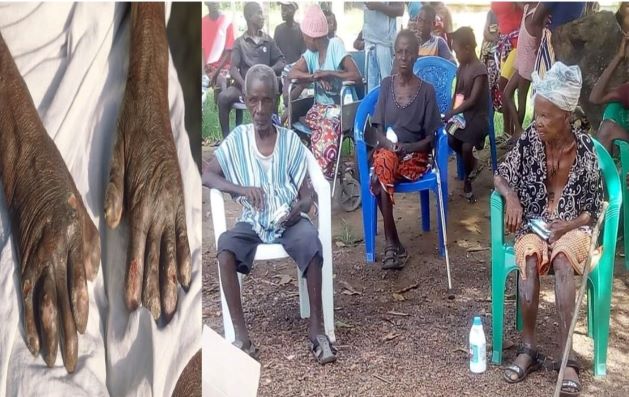PHOTO: Lepers being housed at the Suakoko Leprosy Camp
By Emmanuel Mafelah, mafelahemmanuel29@gmail.com
GBARNGA, Liberia- Amid increasing hardship due to Coronavirus pandemic across Liberia, several lepers at the Suakoko Leprosy Rehabilitation Center in Bong County, are said to be in desperate need of help as they live in fear of their lives.
Leprosy is a chronic, progressive bacterial infection caused by the bacterium Mycobacterium leprae. It primarily affects the nerves of the extremities, the skin, the lining of the nose, and the upper respiratory tract. Leprosy is also known as Hansen’s disease, says www.healthline.com.
.
Popularly known as the Suakoko Leprosy Camp, it was established many year ago to host severe leper patients who were unable to overcome the fear and stigmatization from their communities and other family members.
The center was constructed by former Liberian President William V.S Tubman in 1955 and it currently hosts more than 400 people, including lepers along with their siblings.
Prior to the Covid-19 outbreak in the country, inhabitants of the leprosy camp were heavily challenged. Getting their daily bread and accessing quality healthcare services were difficult.
Many of them are not only worried about contracting the virus but how will they be treated if they fall sick.
Speaking to Reporter at the Leper Colony on Wednesday July 22, 2020, the Administrator, Justin Togbah said since the outbreak of the COVID-19, life have become extremely difficult for them in finding earn means especially in getting the needed healthcare services.
The center is currently encountering strange diseases such as diarrhea and cholera due to the contaminated creeks they use for drinking and bathing, according to Mr. Togbah.
He said there is no safe drinking water for inhabitants of the center, as its two hand pumps are damaged.
Prior to the COVID-19 outbreak, lepers at the Suakoko center have been receiving some assistance from an organization called, “Kwatekeh Africa” with little or nothing from central government, Administrator Togbah said.
Mr. Togbah then called on philanthropist organizations, goodwill individuals and national government to come to their aid, especially with the provision of food and non-food items in order to curtail the hunger.
Tinneh King, 57, a leprosy patient in the area said since 1980, she was taken to the center by her family to get treatment. But now, her leg has been amputated due to the lack of adequate medication as was in the past.
“When we came here in the early 80s, the disease was just on my foot. After five years it started to spread until it got to my entire body including my legs. It really affected me to have my other leg amputated,” she explained.
Madam King is worried that if the virus escalates, they (leprosy patients) will suffered due to the lack of support from national government and partners.
Another patient, Johnson Myers complained about the lacks of support for his four children, including food, medications and among other.
“Since I came here, I have not gotten the necessary medication. Every day, they are giving us pain tablets or paracetamol. We are really suffering,” she narrated.
For his part, Kwategeh Africa project coordinator, John Kplon has joined the leadership and lepers at the center to appealed for urgent supports in order to restore their loss hope.
He wants the lepers to be fully supported despite the economic constraints.
Mr. Kplon believes that lepers have long been abandoned by the county authorities and national government but recommitted his organization unbending support to the overall improvement of the community and its people.

